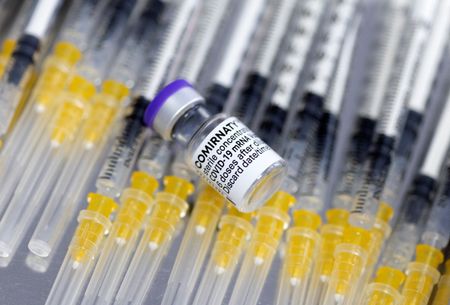By Michael Erman, Ludwig Burger and Manas Mishra
(Reuters) -Pfizer set off a fresh round of concern about the size of the U.S. COVID-19 vaccine and treatment market in the long term, driving down shares on Monday of its German partner BioNTech and smaller rival Moderna.
Vaccine makers are depending on the U.S. market as many countries have more limited yearly campaigns for giving updated shots. For BioNTech, Moderna, and Novavax, COVID vaccines remain their only approved products.
BioNTech shares dropped 7.2% in Frankfurt trading while Moderna was down 5% and shares of Novavax, whose new shot is only approved in the U.S., were off 7% in New York.
Shares of Pfizer were up nearly 5%, however, buoyed by a $3.5 billion cost-cutting plan the drugmaker announced late on Friday alongside its new COVID sales outlook.
Pfizer reduced its full-year forecast for sales of its antiviral COVID treatment Paxlovid by about $7 billion, and for the vaccine it developed with BioNTech by about $2 billion due to a plunge in use of pandemic-related products. It said it would make cuts this year and next and take a write-down.
On an early Monday call with analysts, Pfizer CEO Albert Bourla said he expects around 17% of the U.S. population will get updated COVID shots during the current vaccination campaign, in line with last year, but far below rates seen when vaccines first emerged in the spring of 2021.
Going forward, Bourla said the company expects this year’s demand to be the base rate but it was still watching the current campaign to be sure.
The U.S. is “in the middle of COVID fatigue, where everyone wants to forget about the disease,” he said.
Moderna, in a statement on Monday, maintained its current revenue forecast of $6 billion to $8 billion for its COVID vaccine for 2023.
Leerink analyst Mani Foroohar, who has an “underperform” rating on Moderna, said it is difficult to have confidence in the company’s market forecast given the pace of vaccinations. So far this fall, about 7 million of the updated COVID shots have been given in the U.S.
Foroohar said he is concerned with Moderna’s rate of spending and that the drugmaker is at risk of ending this year with less than $10 billion of cash on its balance sheet, adding that it may need to increase cost cutting.
Jefferies analyst Michael Yee said Pfizer’s new COVID outlook implies lower vaccine sales for Moderna than it had forecast.
Moderna was not immediately available for comment.
BioNTech, which relies on vaccine-related profit-sharing payments from Pfizer for much of its revenue, said it would take a write-down of up to 900 million euros ($947 million), the same size charge Pfizer announced for it on Friday.
BioNTech added that it had been told by Pfizer that most of the write-offs relate to raw materials, as well as to inventories of vaccine versions that are older or different from the updated one currently in use.
Pfizer’s total non-cash charge of $5.5 billion in the third quarter also includes $4.6 billion in inventory write-offs for its antiviral Paxlovid.
A BioNTech spokesperson on Monday declined to comment on the company’s current 2023 outlook. It reports earning on Nov. 6.
Pfizer’s shares, which are down about 37% this year, trade at 9.8 times their 12-month forward earnings estimate, while BioNTech trades at 26.7, according to LSEG data.
($1 = 0.9498 euro)
(Reporting by Ludwig Burger and Rachel More in Frankfurt, Michael Erman in New York, and Bhanvi Satija and Manas Mishra in Bengaluru; Editing by Jonathan Oatis, Caroline Humer and Bill Berkrot)

